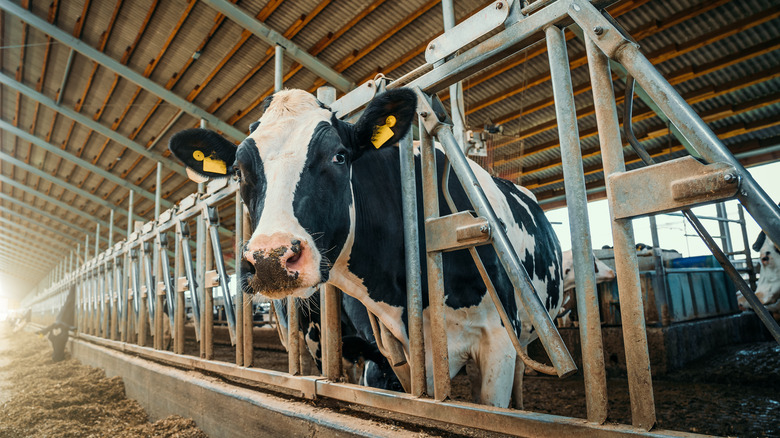Is It Ever Worth Buying Organic Milk?
A growing number of consumers are buying organic dairy in an attempt to eat better. Statista reports that in 2021 Americans purchased more than 2.5 billion pounds of organic milk despite its hefty price tag. The food product comes from grass-fed cows and, therefore, is supposed to contain no chemicals or growth hormones.
Organic dairy products, including cow's milk, are heavily regulated by the U.S. Department of Agriculture. Farmers can only use antibiotics and other drugs if the animal is ill. Plus, their cows must be fed organic feed and have enough space to roam freely. Their food cannot contain synthetic preservatives, hormones, animal by-products, or genetically modified ingredients.
These regulations support the environment and animal welfare, and they might be good for your health, too. In fact, milk is one of those foods you should always buy organic — although there's some debate on its potential benefits. For example, a 2016 study published in the British Journal of Nutrition found that organic milk boasts higher levels of healthy fats than its regular counterpart. However, other experts say this difference is too small to justify the price tag.
What's wrong with regular milk?
Cow's milk was once considered one of the healthiest foods. This delicious beverage has over 15 grams of protein per glass, plus 42% of the recommended daily calcium intake, 32% of the recommended daily amount of vitamin D, and large doses of phosphorus, selenium, zinc, and B vitamins. It's also an excellent source of vitamin A, copper, magnesium, and other key nutrients. But even so, there are plenty of reasons you should stop drinking milk — or at least choose an organic version.
In a 2019 study, researchers analyzed 69 conventional and organic milk samples from nine U.S. regions. Most samples of conventional milk contained pesticide residues, antibiotics, and growth hormones, including potentially harmful compounds like atrazine, diazinon, and cypermethrin, according to the journal Public Health Nutrition. As the scientists note, bovine growth hormones may raise insulin-like growth factor I (IGF-I) levels in humans, which could lead to cancer and impaired immunity. Nearly all samples of organic milk contained pesticide residues, but in lower amounts than regular milk.
The antibiotics in milk and dairy products may cause allergic reactions, DNA damage, and birth defects, suggests a 2019 review featured in the Journal of Advanced Veterinary and Animal Research. Over time, these drugs can contribute to antibiotic resistance, infertility, cancer, and digestive disorders. Moreover, The Harvard Gazette reports that conventional dairy foods account for at least 60% of the estrogens in our diet, which may potentially further increase cancer risk.
Organic milk isn't necessarily a better option
Most studies show that organic milk is superior to its regular counterpart, but that's not always the case. "About half of the organic milk sold in the U.S. is coming from very large factory farms that have no intention of living up to organic principles," said Mark Kastel, a senior farm policy analyst, in an interview with The Washington Post. However, it's one thing to buy organic milk from small dairy farms, and another thing to get it from large dairy farms. The latter "are trying to cut corners in the interest of producing milk as cheaply as possible," Kastel told The New York Times.
Leaving this aspect aside, real organic milk may be healthier than conventional milk. For starters, it's free of pesticides and other chemicals. This beverage is also higher in conjugated linoleic acid (CLA) and omega-3s, offering up to 60% larger doses of alpha-linolenic acid, 32% more eicosapentaenoic acid, and 19% more docosapentaenoic acid than non-organic milk, according to a 2013 study published in PLOS One. Its nutritional value is due to the large amounts of grass and forage legumes consumed by cows.
CLA, one of the most abundant fatty acids in organic cow's milk, may protect against cancer, diabetes, and heart disease, says Healthline, but the research is mixed. Similarly, according to Harvard T.H. Chan School of Public Health, omega-3s promote cardiovascular health and fight inflammation. Cleveland Clinic notes that some studies also suggest that omega-3 fatty acids may lower the risk of dementia, cancer, and eye disorders.
Is organic milk worth the price?
Experts are divided when it comes to organic milk. On the one hand, many studies confirm its nutritional value and potential health benefits. Plus, there's no denying that organic milk is better for the environment, as well as for farm animals and small businesses, than its regular counterpart. On the other hand, its nutritional profile isn't much different than that of regular milk, according to Mississippi State University.
Researchers say that both organic and conventional milk are strictly regulated and undergo extensive testing to ensure they contain no detectable levels of pesticides or antibiotics. Any samples that fail to meet these standards are banned from sale. However, Mark Kastel and other experts have a different opinion on this matter.
Furthermore, Mississippi State University claims that organic and regular milk are similar from a nutritional standpoint. Some studies found that organic milk is higher in protein and fat, whereas others suggest that regular milk is more nutritious. In either case, milk composition depends on a multitude of factors, including the cow's genes. All in all, the research is mixed — and it's up to consumers to decide what's best for them. Perhaps a better option would be to switch to plant-based milk, which contains no animal ingredients.



